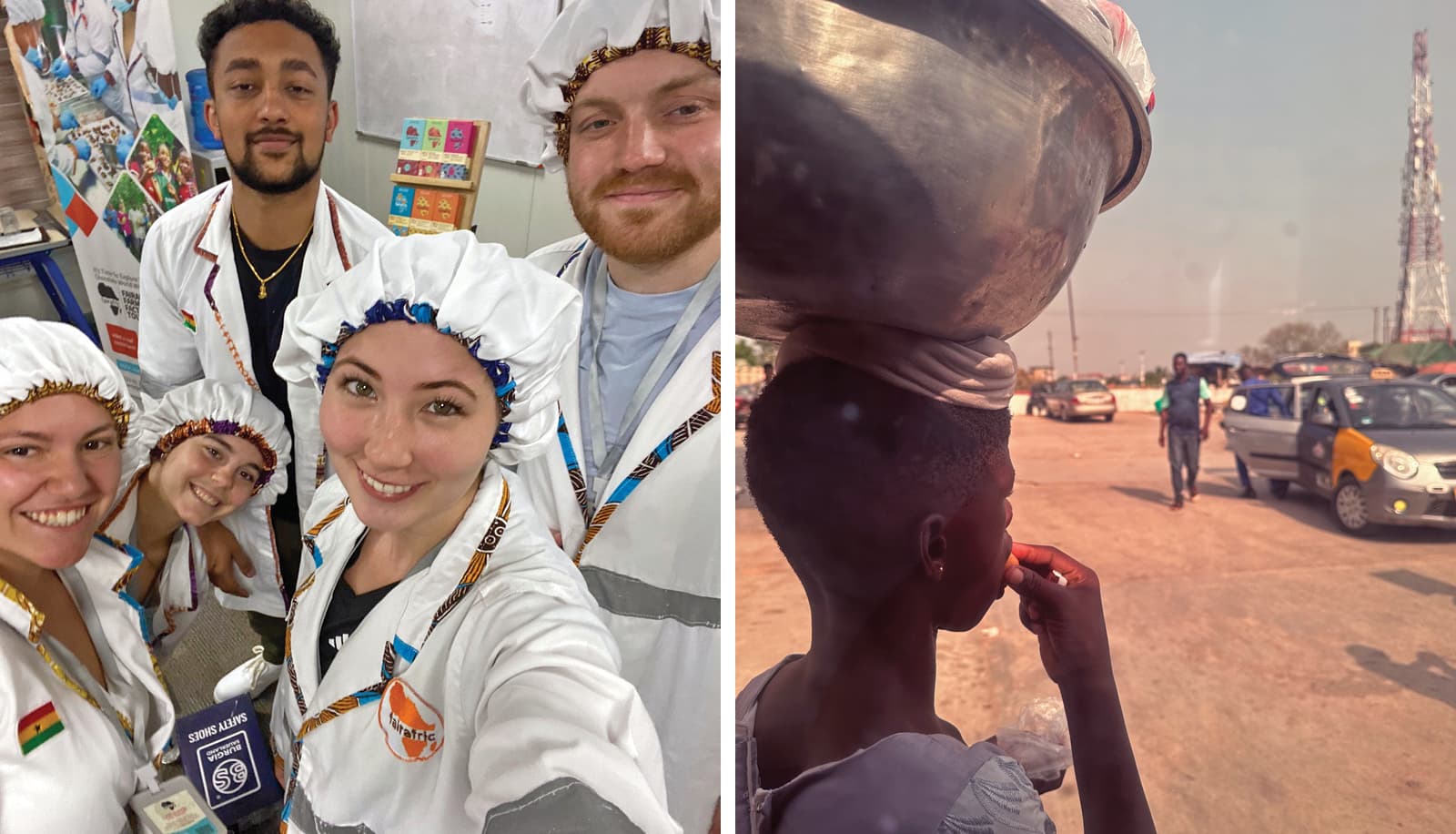
Beyond the Clinic
WNE Students Bring Compassion and Care to Ghana
By Dr. Melissa Mattison
Imagine sitting in 95-degree heat, waiting to see a healthcare provider in an exam room that was set up in a church storage space or behind a modest partition that is equipped with borrowed exam tables from a nearby clinic. Keep in mind, you are not alone. More than one hundred others are also waiting patiently without a number system, simply taking a seat in chairs rented from a local facility.
It may not sound ideal by American healthcare standards, but in Ghana, there is little frustration or impatience. People chat with neighbors, laugh together, and enjoy the rhythm of background music played by a local DJ. There is a shared sense of community and gratitude.
This is the type of environment that Western New England University (WNE) students and preceptors found themselves experiencing during an elective interprofessional Advanced Pharmacy Practice Experience (APPE) in Ghana, West Africa earlier this year.
During three transformative weeks, students participated in three hosted community events, immersed themselves in the Ghanian culture, learned beside fellow practitioners, and experienced a healthcare system very different from their own.
In January 2025, four WNE pharmacy students participated in home visits, school health education, and mobile health clinics offering screenings for hypertension, obesity, diabetes, and sexually transmitted infections (STIs). They also worked alongside midwives from the Planned Parenthood Association of Ghana (PPAG) to provide cervical cancer screenings—serving hundreds of patients in rural and remote villages.
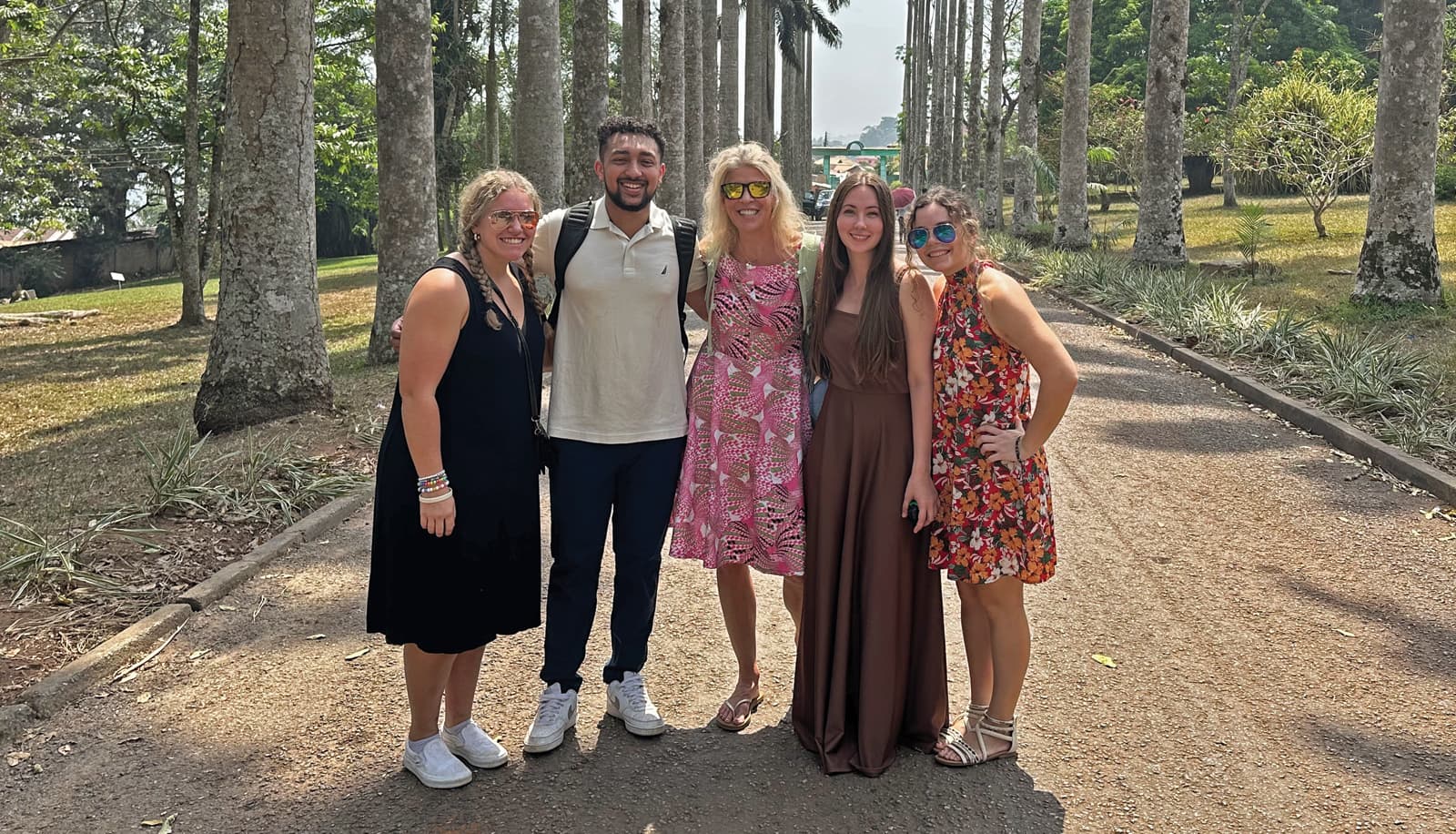
Why Travel Across the World?
Pharmacy students nationwide are required to complete 1,440 hours of experiential education during their final year of pharmacy school, encompassing various practice settings. At WNE, this means completing six six-week rotations, which includes ambulatory care, acute care, institutional, and a community rotation. While two elective rotations give students flexibility to explore more specialized interests.
To fill those electives, students may apply for an international experience in Ghana working alongside fellow students from multiple healthcare professions, experienced preceptors, and Ghanaian healthcare workers. The WNE College of Pharmacy and Health Sciences Office of Experiential Affairs oversees the application process, collaborating with the interprofessional teams to select participants.
WNE partnered with the University of Massachusetts (UMass) School of Public Health several years ago to build this program. This project has allowed WNE to team up with students in pharmacy, public health, and physician assistant (PA) studies, as well as practicing healthcare professionals from across the United States (U.S.). The result is a deeply collaborative three-week immersive experience that continues to grow in size, scope, and impact, engaging students from a broader range of disciplines like occupational therapy (OT), PA studies, and laboratory sciences.
Once accepted into the program, students begin checking off a lengthy to-do list starting with securing a passport and receiving an extensive list of immunizations: yellow fever, typhoid, polio, hepatitis A and B, and Tdap. Preparation also includes six months of bi-weekly virtual meetings with preceptors from the U.S. and Ghana, as well as fellow students. These sessions help participants build rapport, align goals, and construct their projects before stepping foot overseas.
One of the key goals of this experience is for students to view healthcare through the lens of both public health and international practice. Participants are asked to compare systems in Ghana with healthcare in the U.S.—despite being separated by over 5,000 miles, many of the challenges they face are the same.
Immersed in the Culture
While in Ghana, students are accompanied by a cultural liaison who handles transportation, facilitates local planning, and shares insight that enhances both safety and cultural engagement. This year, the liaison’s sister hosted the team at her home for several meals under mango trees, where students enjoyed spicy goat dishes, jollof rice, nut soup, and sobolo—a traditional hibiscus drink.
This trip is not run by a large organization— rather a grassroots initiative that thrives on connection and community. Throughout their stay, students explore and engage with Ghanaian culture through visits to Elmina Castle, a pineapple farm, nature reserve, and Fairafric Farm, a cocoa orchard and chocolatier. They shop in vibrant local markets, have tailored clothing and bags made from bold African fabrics, taste local cuisine by trying their hand at cooking over open fires, and traverse miles of red dirt roads to reach rural villages.
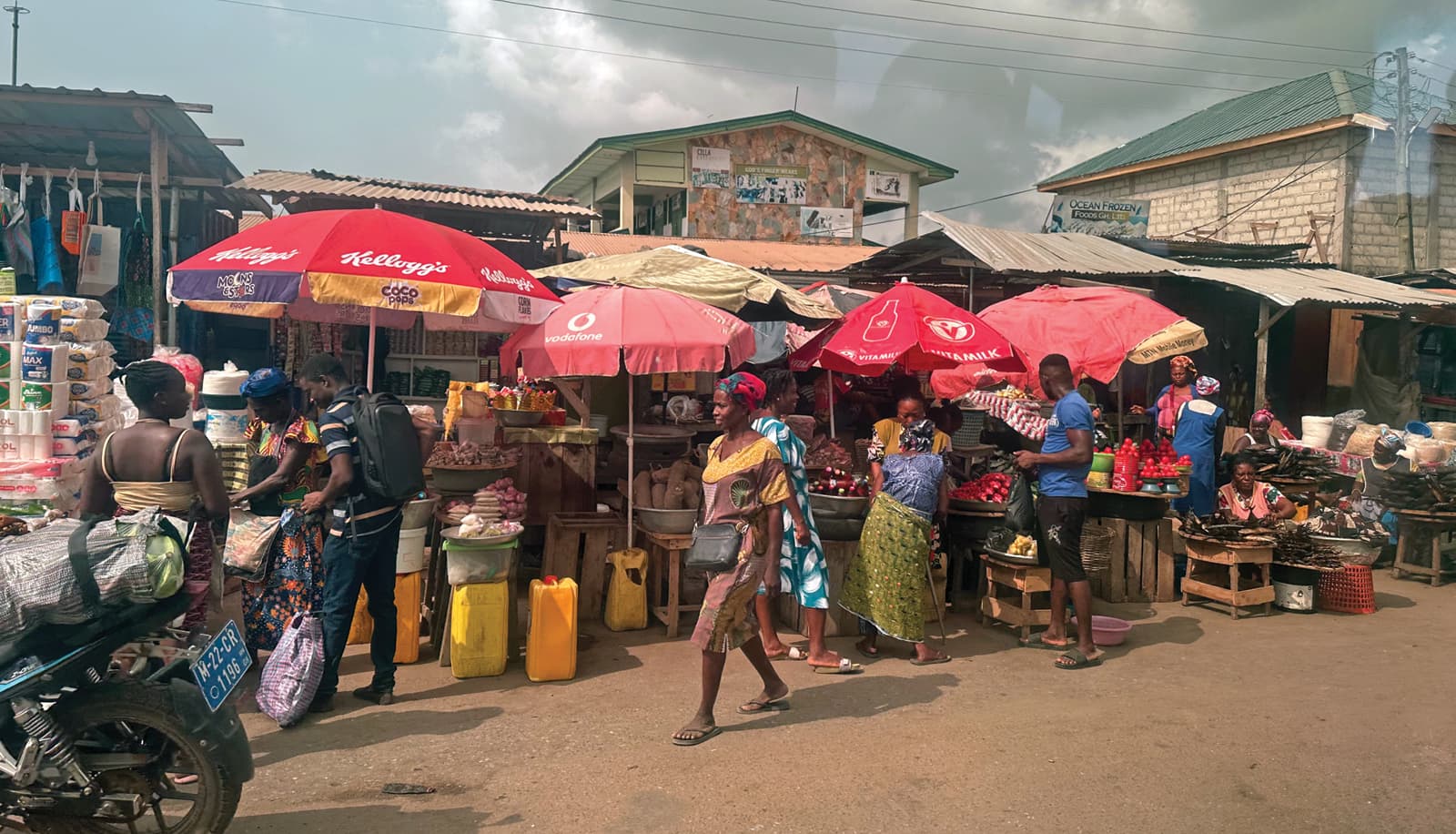
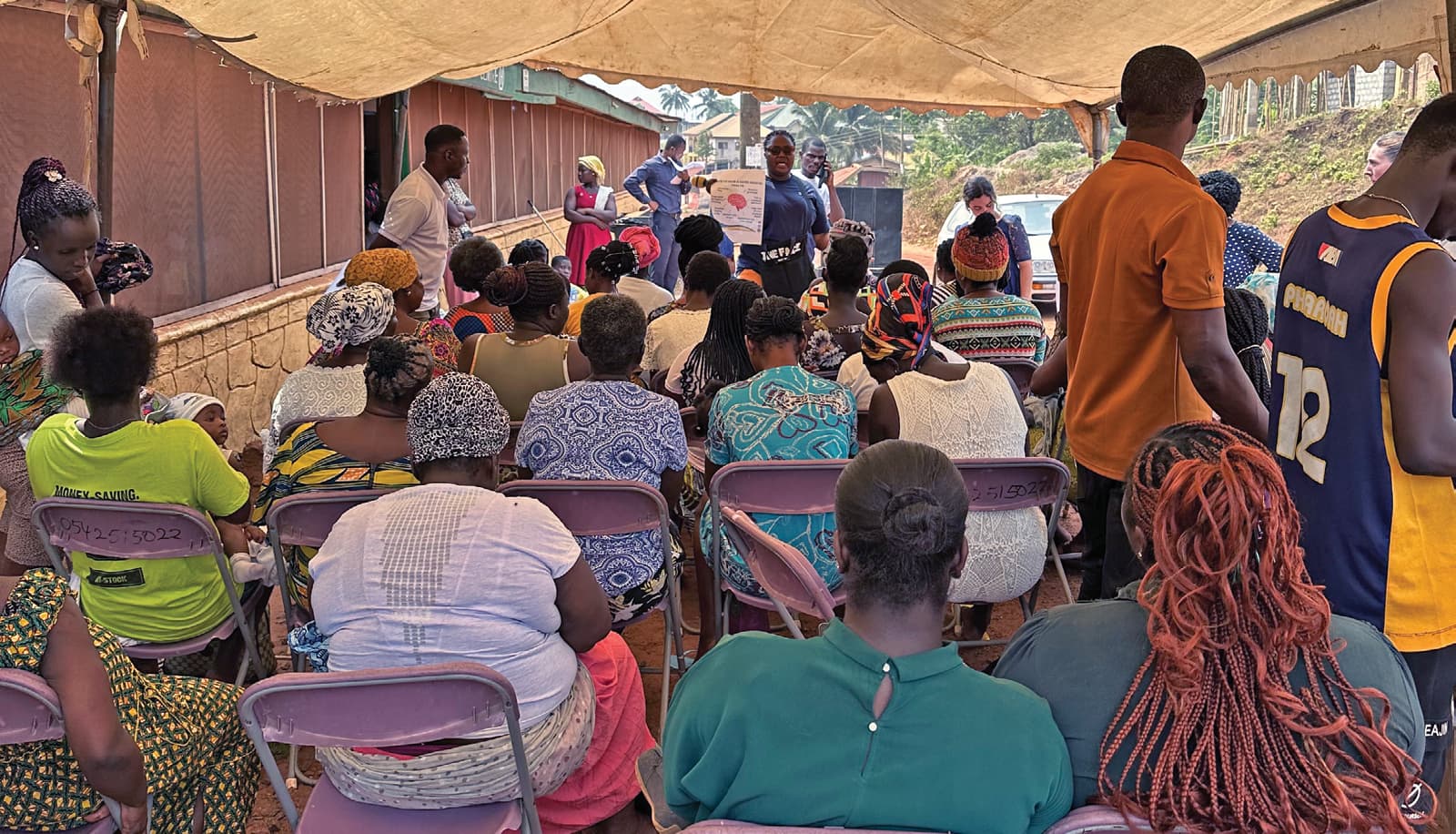
Making an Impact on Healthcare
In Aburi, Ghana, the program’s partners help shape the projects and the work that is done while abroad. In order to be prepared before the trip, students are grouped with Ghanaian practitioners to design health-focused projects based on the identified community needs. This year’s projects addressed infectious diseases like scabies, mental health, chronic disease, and women’s health. These efforts included education for local practitioners and guidelines for community members such as training residents in blood glucose monitoring.
Last year, one public health student raised funds to purchase reusable, washable period pads from Days for Girls, distributing them at a local high school after leading a health education session. While, another group of students continued supporting a 16-year-old patient with type 1 diabetes, who first received consultation during last year’s inaugural trip. For the second year in a row, students helped her with insulin and essential supplies, witnessing firsthand the power of sustained outreach.
Students also tour Ghana’s healthcare infrastructure, from community pharmacies to hospitals, learning which medications are available and how distribution works in low-resource settings. Often discovering that rural clinics have only a few medications at a time. These eye-opening experiences prompt students to question healthcare disparities and think creatively about solutions.
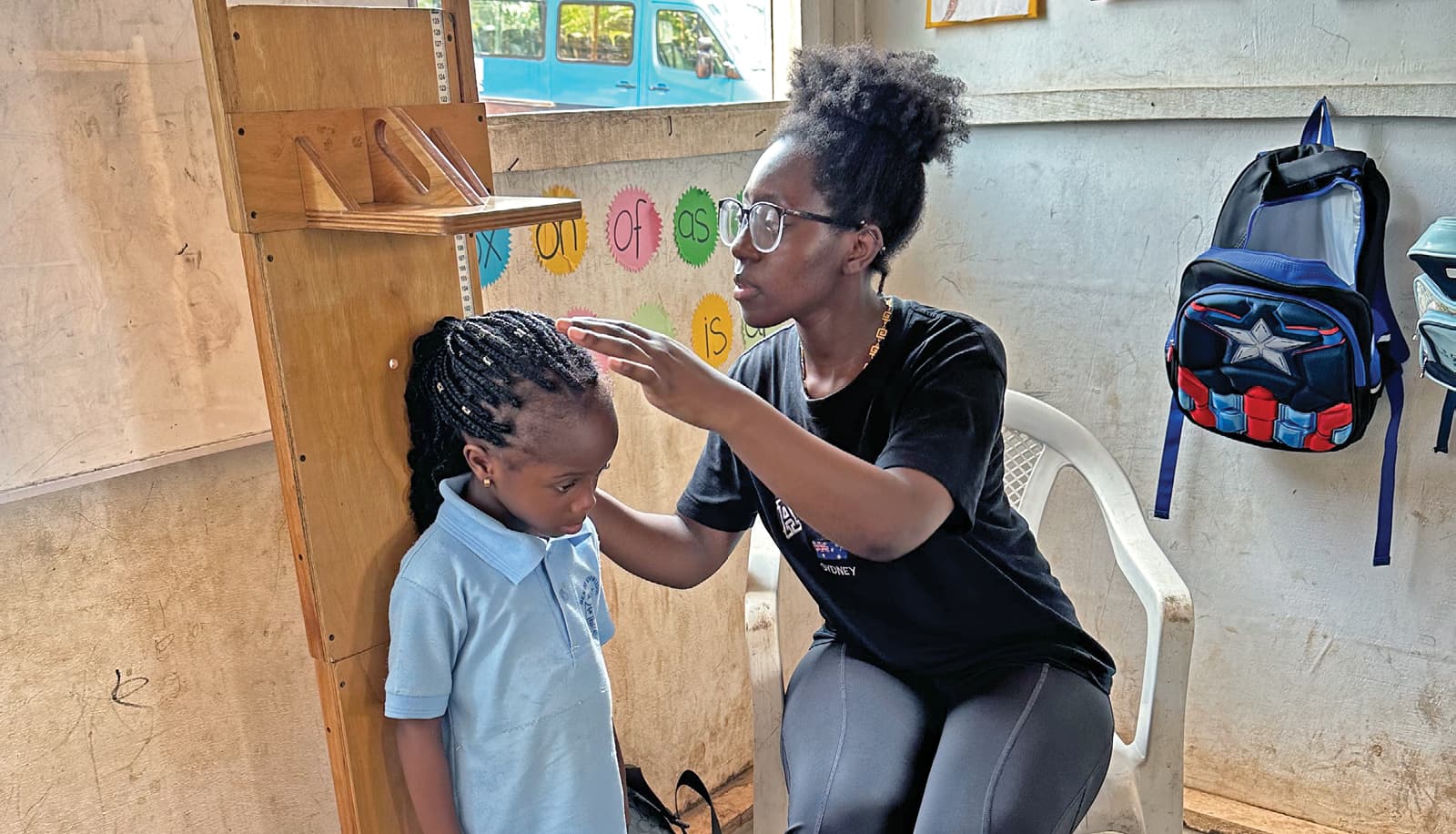
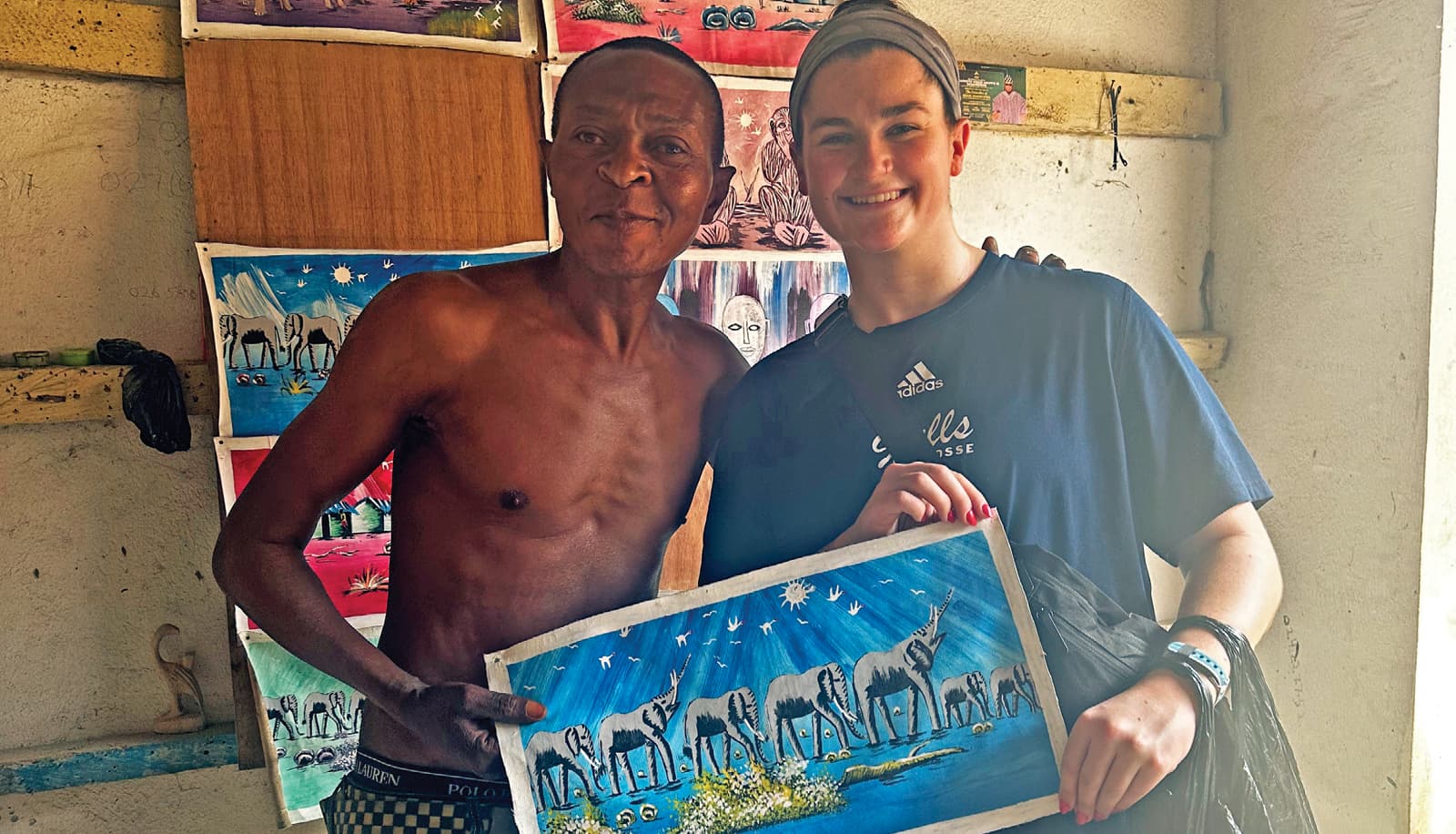
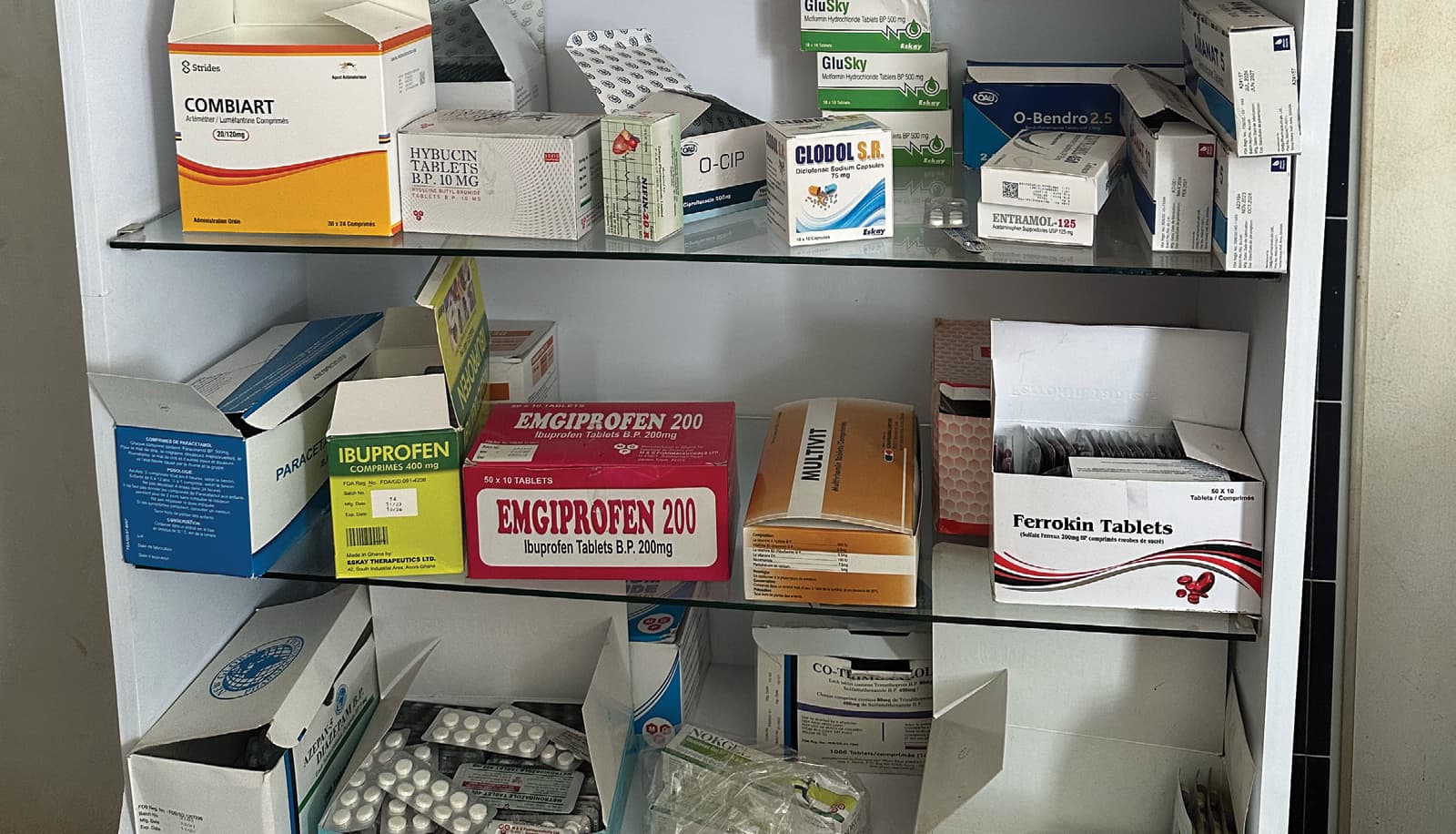
Outreach That Reaches Further
Clinical experiences are at the heart of this trip. Students take part in routine home visits led by Ghanaian public health nurses—greeting each patient with “Akwaaba,” a respectful request to enter someone’s home. These visits, often held just outside the front door under mango trees and observed by neighbors, reveals clues about a patient’s personal environment and the importance of healthcare within these rural communities.
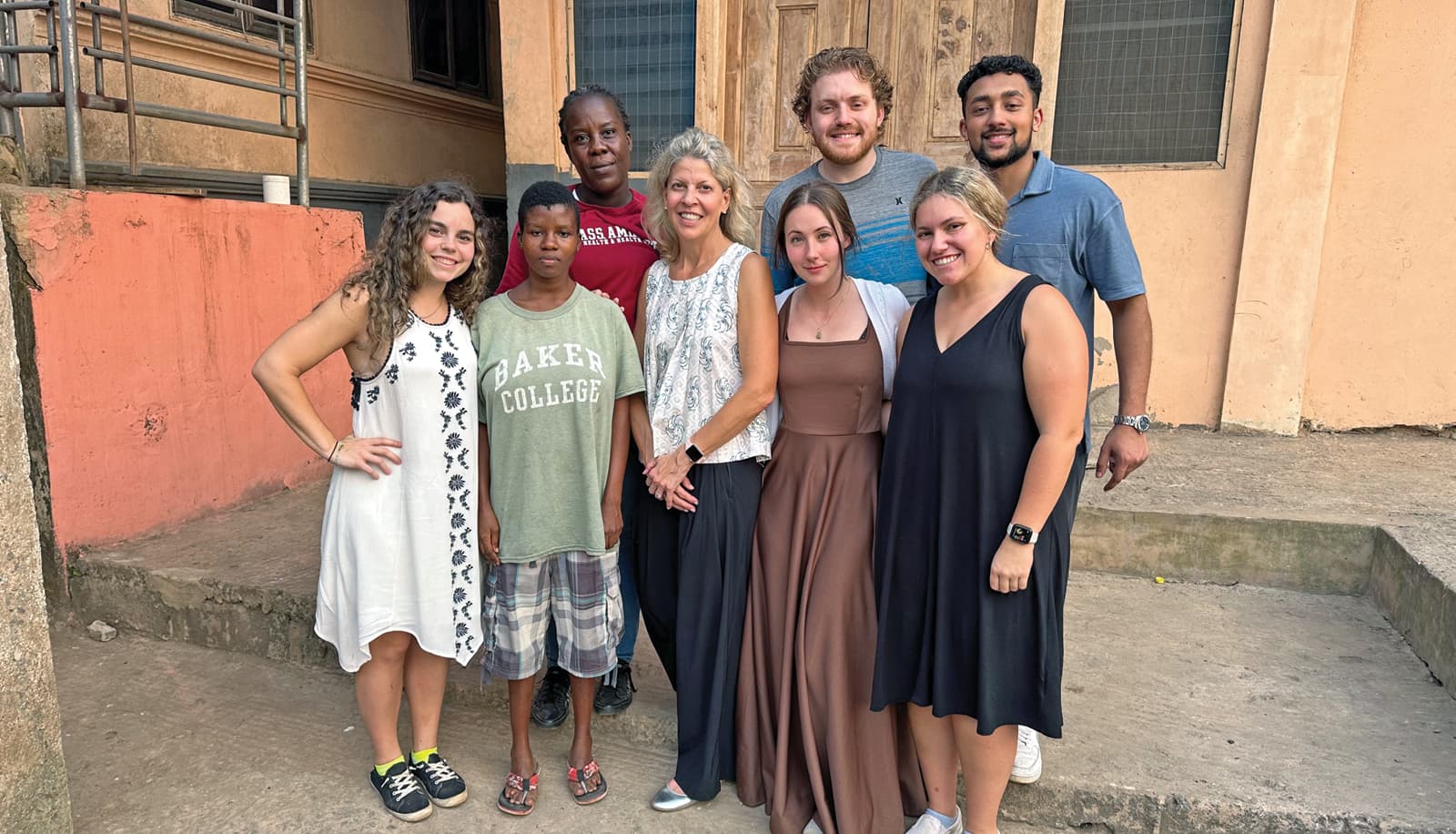
The team sees a full range of patients from newborns to pregnant women to individuals managing mental health or chronic disease. Follow-up care is consistent, with nurses conducting home visits several days a week.
In addition to these visits, WNE students engage in school-based health outreach. This year, they visited a fifth-grade classroom to teach the importance of dental hygiene and distributed toothbrushes. Last year, they measured and assessed primary school students for malnutrition, only to discover that the equipment—scales and stadiometers—had warped in the heat and dust, compromising accuracy.
When this challenge was brought back to campus, Professor of Biomedical Engineering Dr. Mike Rust, enlisted a group of seniors to develop a prototype suited to Ghana’s challenging environment. The innovation is currently underway—a perfect example of how one observation abroad can inspire change at home.
The Long-Term Vision
This project aims to engage students outside the classroom, allowing them to apply their education firsthand while navigating cultural differences and low-resource environments. Working side by side with healthcare workers and patients, students learn that even limited resources can yield meaningful care when paired with creativity and compassion.
The ultimate goal is to establish a longitudinal program moving beyond an annual visit to a sustained presence, ensuring follow-through and a community-driven approach. The College of Pharmacy and Health Sciences Office of Experiential Affairs is now also partnering with Bay Path University as they work towards launching a second visit each year, beginning in August. With interprofessional biannual visits to the Akuapem South District, the program can move away from short-term outreach and towards long-term partnership.
In this way, the Ghana APPE becomes more than a rotation—it becomes a model for how to care, learn, and lead.
Student Testimonials
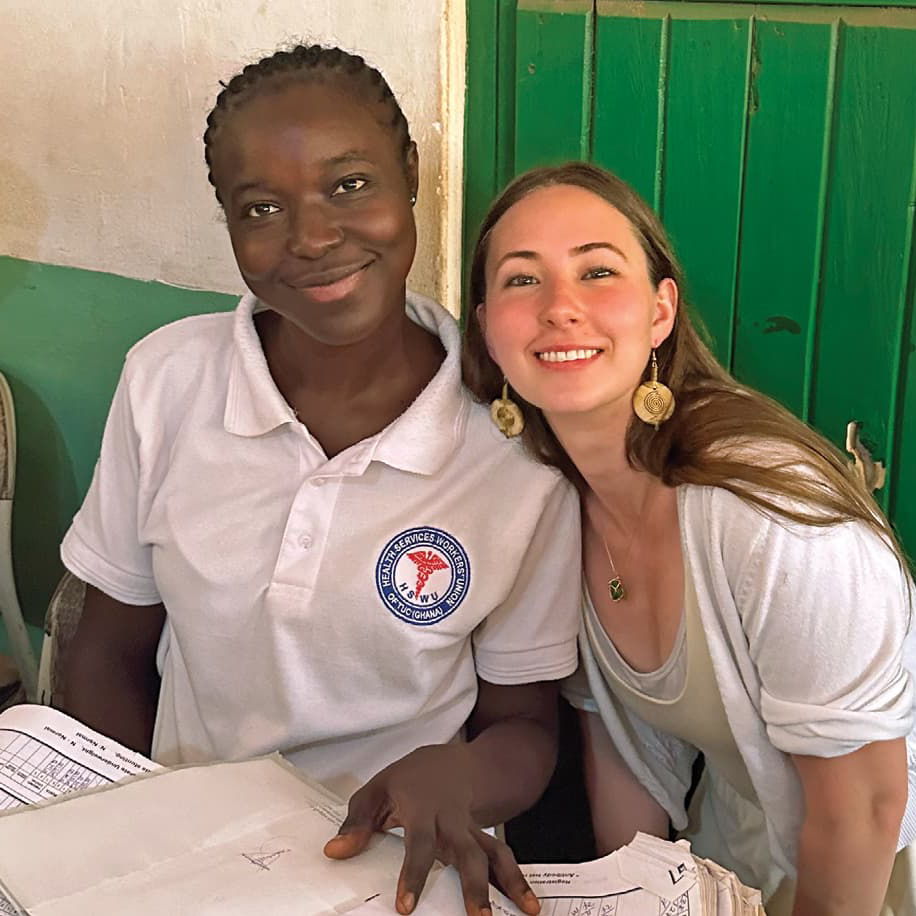
“…I was determined to dive into this rotation with an open mind. My goal was to be adventurous and to try new things when the opportunity arose. Although some dishes may have been too spicy for my palate, overall, the food far exceeded my expectations. This was my first time trying jollof rice, chicken basquaise, papaya, and even goat which was surprisingly delicious.”
“[reflecting on the labor and delivery process] Getting to walk through the centers and hear them say the women had to walk home within six hours of giving birth was very eye-opening. In the U.S., they give epidurals during delivery and offer a wide variety of prenatal medications before and during pregnancy, whereas in Ghana they get a bucket with supplies during pregnancy and only use Tylenol® as their medication during delivery. Overall, it was an amazing experience to get to work with the healthcare providers there, and help make care more accessible for a number of people amongst the different villages during our community outreach events. This is an experience I will never forget, and I hope to return over the years and see what changes are made in their healthcare systems.”


